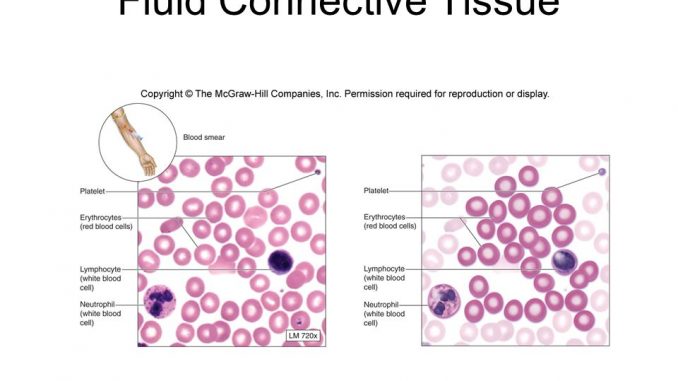
Fluid or liquid connective tissue: blood and lymph
1. Blood
- Blood is composed of blood corpuscles (45%) and blood plasma(55%)
- An average person has 5-6 ltr of blood.
Blood Plasma:
- It is pale yellow liquid, composed of 90% water and 10% inorganic and organic substances. It contains different proteins(albumin, fibrinogen, globulin), hormones, inorganic salts etc
Blood cells: 3 types-i) erythrocytes, Leucocytes and Thrombocytes
i. Erythrocytes (RBC)
- small,biconcave, non nucleated (fish, amphibian, reptiles,birds, camel;nucleated)
- Number varies from 4.5-5 million per mm3
- Cytoplasm has haemoglobin, hence appear red in color.
- Transpart O2 and CO2
ii. Leucocytes (WBC)
- These are larger than erythrocytes and are present in much smaller amount, their ratio to RBC is 1:600
- 5000-10000 per mm3
- They are devoid of hb, colourless
- They have prominent nucleus
- They are produced in red bone marrow and in lymphatic glands
- Life span is of few days
- They are immune cells
- 2 Types- Agranulocytes and Granulocytes
- Agranulocyte: 2 types- i) Monocytes– larger cell with bean shaped nucleus ii) Lymphocytes- larger spherical cell with oval nucleus.
- Granulocyte: 3 types- i) Eosinophil- spherical cell with bilobed nucleus, stained with acidic dye. Main function to neutralize toxins and have anti-histamine property ii) Basophils- spherical cell with multi lobbed nucleus( S-shaped), stained with basic dye. Produce histamine and heparine iii) Neutrophil- spherical cell with multi lobbed nucleus, stained with neutral dye. Phagocytic function
iii. Thrombocytes (platelets)
- These are irregular cells, even smaller than RBC
- They are often without nucleus, but cytoplasm contains distinct granules
- They are the fragments of protoplasm broken from large bone marrow cell; megakaryocytes
- Their life span is of 7 days
- They release platelet releasing factors which help in blood cloting.
2. Lymph:
- Lymph is similar in composition to blood plasma except that it lacks red blood cells, platelets, plasma protein required for clotting and other macromolecules found in blood.
- It flows through lymphatic vessel
- helps in immunity.
